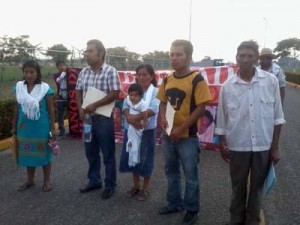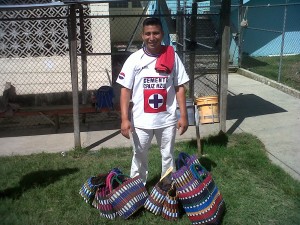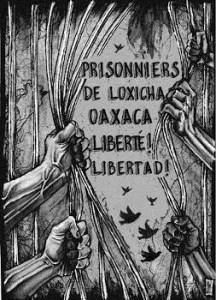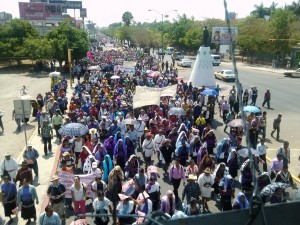
presos políticos

(Español) Informe desde el CEFERESO 6 en Tabasco de la Brigada de Acompañamiento a los presos Loxicha
Boletín informativo de familiares y amigos de los presos loxichas
Al Pueblo de Oaxaca, México y el Mundo
A las Organizaciones honestas que defienden los Derechos Humanos
A los medios de comunicación
Los hijos, padres y esposas de 5 de los Presos Loxicha, nos dimos a la tarea de organizar la 2a Brigada de Acompañamiento a los Familiares de los Presos Loxicha, para exigir el ingreso al CEFERESO No. 6 que se ubica en Huimanguillo, Tabasco., y comprobar si verdaderamente se encontraban ahí y en qué condiciones se encontraban.
Al llamado respondieron, la sección XXII, a través del área jurídica, la secretaría de alianzas y la comisión política, así como colectivos adherentes a la Sexta, y compañeros de Medios Libres.
Salimos de la Ciudad de Oaxaca a las 10:45 de la noche, y arribamos a Huimanguillo Tabasco pasadas las 11 de la mañana del miércoles 26 de junio. Al medio día llegamos al CEFERESO No 6, en donde fuimos recibidos por policías federales fuertemente armados quienes nos negaron el acceso. Minutos después llegó un grupo de granaderos antimotines de la policía federal en actitud amenazante e intimidatoria, encabezados por una persona que dijo llamarse Jesús Domínguez Nava, Supervisor de seguridad penitenciaria, diciendo que únicamente ingresarían familiares directos con su respectiva identificación oficial, y que esta sería la única ocasión que ingresarían con un pase provisional, después solamente ingresará quien cumpla con el trámite correspondiente.
Ante esta situación comenzamos a gritar nuestra consigna de Libertad a los Presos Loxicha, nuestra única forma de hacer visible la injusticia; Juan Pérez Delgado quien dijo ser director del CEFERESO No 6, dio la orden para que nos invitaran a retirarnos y quitar nuestras pancartas con el argumento de que estábamos dentro de área federal.
A la 1 de la tarde ingresamos los familiares de Abraham García Ramírez, Justino Hernández José, Zacarías Pascual García López, Agustín Luna Valencia y Alvaro Sebastián Ramírez; negándonos el acceso a amigos y abogados de la sección XXII.
Después de hora y media de espera, lograron ingresar los familiares, la visita fue presencial y en un área especial destinada para ello. Los encontramos muy sorprendidos de haber ido hasta allá a visitarlos, y nos piden que sigamos luchando por su libertad.
Los familiares pudimos constatar que la estancia en el CEFERESO No 13 en Mengolí de Morelos, Miahuatlán, no es lo que se menciona en los medios y que los funcionarios de ese Centro de Exterminio repiten incansablemente. La realidad es que recibieron torturas y vejaciones constantes, que se repitieron durante el traslado a Huimanguillo, Tabasco.
Seguimos denunciando las actitudes de cinismo que adoptan los malos gobiernos de Enrique Peña Nieto y Gabino Cué Monteagudo, quienes con mentiras pretenden que la sociedad mexicana acepte los Penales de Máxima Seguridad como algo necesario, lo repetimos fuerte y claro, los CEFERESOs son “Laboratorios de Exterminio”.
Denunciamos el aislamiento de 30 días al que están obligados nuestros familiares los Presos Loxicha, la incomunicación de la que son objeto, y el hecho de que sean alejados de sus familias, amigos y redes de apoyo solidario.
No nos tragamos el cuento de que vivirán mejor en un penal de Mediana o Máxima Seguridad, que comerán a sus horas, que harán ejercicio, que tendrán momentos de esparcimiento y trabajo, que podrán continuar sus estudios; no nos resignamos a que sigan encarcelados por un delito que no existe, sabemos que no hay nada que se compare con la libertad y seguiremos luchando por eso, POR LA LIBERTAD INMEDIATA E INCONDICIONAL DE NUESTROS PRESOS LOXICHA.
17 años en prisión injusta, ahora secuestrados en un penal de Máxima Seguridad disfrazado de Mediana Seguridad y a 14 horas de distancia de sus seres queridos y amigos que los apoyan, ¿Cuál es el mensaje que nos quieren dar estos Gobiernos?
Llamamos a todas las personas solidarias a estar atentos y seguir denunciando las injusticias que no paran de cometerse contra los Indígenas Presos Loxicha.
¡Libertad Inmediata e Incondicional a los Presos Políticos y de Conciencia de la Región Loxicha!
¡Con Presos Políticos no hay Democracia!
Familiares y amigos de los Presos Loxicha
27 de junio 2013.
Oaxaca, Oaxaca.

Libertad a Miguel Vázquez adherente a la Sexta de San Sebastián Bachajón
San Cristóbal de Las Casas, Chiapas, México
26 de junio de 2013
Nota informativa
Libertad a Miguel Vázquez adherente a la Sexta de San Sebastián Bachajón
El Señor Miguel Vázquez Deara, del ejido San Sebastián Bachajón adherente a la Sexta Declaración de la Selva Lacandona del Ejercito Zapatista de Liberación Nacional, el día de hoy a las 4.30 p.m. obtuvo su libertad por falta de elementos para procesarlo. Miguel Vázquez estuvo un año y nueve meses privado arbitrariamente de su libertad por delitos prefabricados y se encuentra en camino a su comunidad.
El viernes 28 de junio de 2013 a las 11:00 a.m. las autoridades adherentes a la Sexta de San Sebastián Bachajón darán una conferencia de prensa, en las oficinas de este Centro de Derechos Humanos, en donde informarán los pormenores de la liberación, así como la actualización de la lucha por la defensa del territorio y acciones próximas por la liberación de sus presos.






